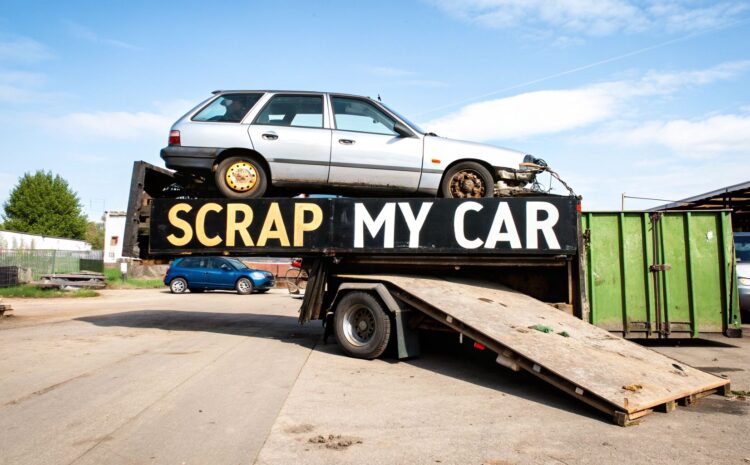
A Guide to How You Can Scrap My Car in the UK
It can be tough deciding to scrap your car, but sometimes it’s just the most sensible financial move. That tipping point usually hits when you’re staring at a repair bill that’s worth more than the car itself. If that sounds familiar, you’re in the right place.
Knowing When It's Time to Scrap Your Car
Letting go of a car you've depended on is never easy. But holding onto a vehicle for sentimental reasons can quickly drain your bank account. The decision to scrap isn't just for cars that have completely given up the ghost; it's often a practical answer to common problems drivers across London and Surrey run into.
Common Triggers for Scrapping Your Vehicle
A failed MOT is one of the most common reasons. Let's say you get a quote for £1,500 to fix the emissions on your old Ford Focus, which is only worth about £500. The maths is pretty clear. Throwing good money after bad just doesn't make sense.
Regulatory changes are another big driver, especially with London's Ultra Low Emission Zone (ULEZ) expanding. If your older petrol or diesel car isn't compliant, you're stuck with a daily charge just to drive it. That adds up fast, making it an expensive habit and pushing many to scrap their vehicles.
The decision to scrap a car is rarely about a single catastrophic failure. It's usually about reaching a financial tipping point where repairs, tax, and emissions charges simply outweigh the car's value and usefulness.
You’re not alone in making this choice. Vehicle scrappage is a huge business in the UK, with over 1.2 million vehicles scrapped in 2024 so far. With the average car on UK roads being retired after about 17 years, this trend isn't slowing down. You can find more UK scrappage statistics that highlight just how common this is.
This isn't just an informal process, either. The government takes it seriously, as you can see on the official GOV.UK website.
You are legally required to inform the DVLA when you scrap your car. It's a formal process, and skipping this step can land you with fines and legal headaches long after you think the car is gone for good.
How to Get an Accurate Scrap Car Valuation
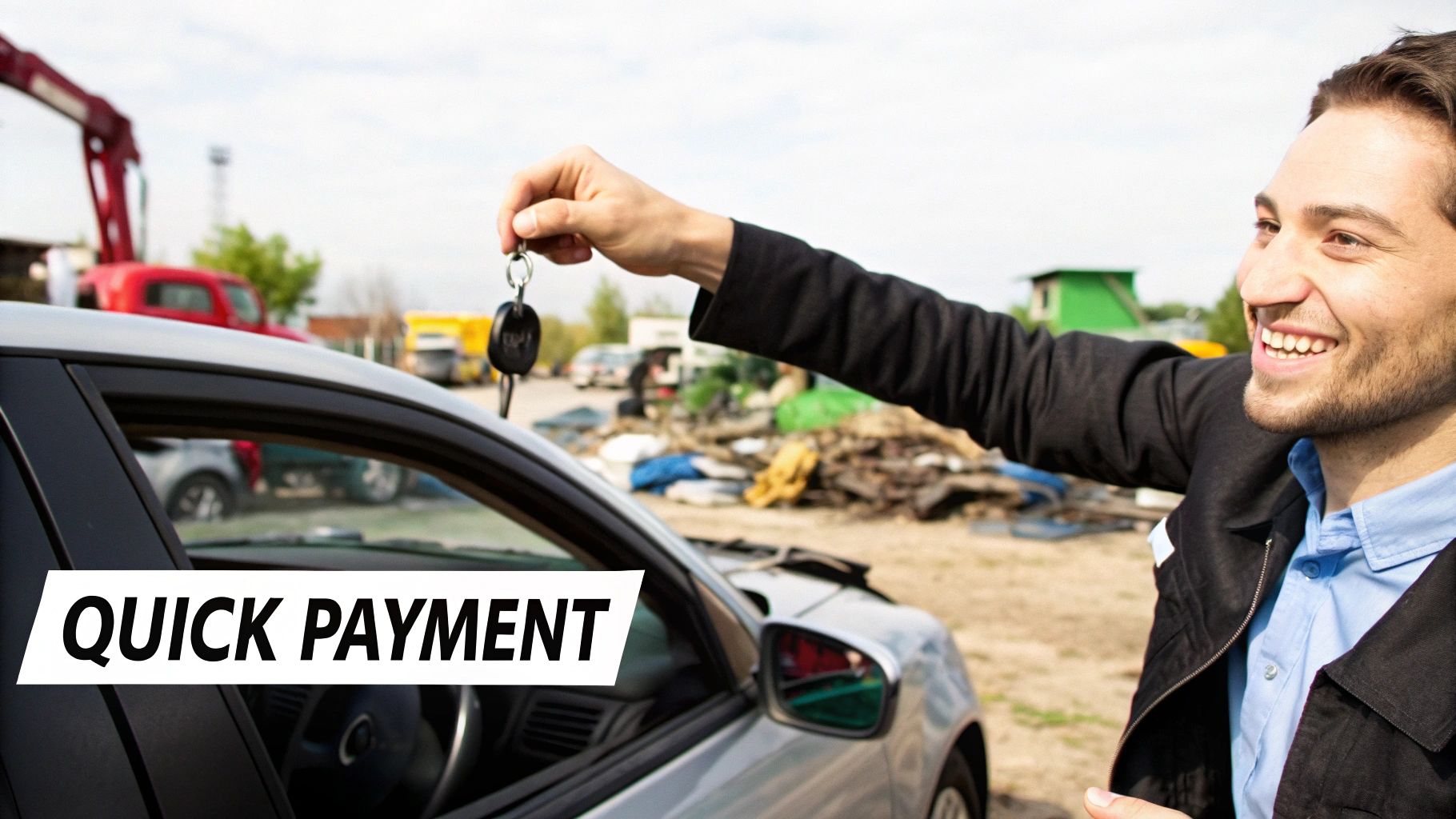
So, you’ve decided it’s time to scrap your car. The first question on your mind is probably, "What's it actually worth?" Getting a handle on how valuations work is key to making sure you get a fair price and don't get taken for a ride. The quote you receive isn’t just plucked from thin air; it’s calculated based on a few really important factors.
At its core, the value comes down to one main thing: the car’s weight. Scrap metal is a commodity, and it’s sold by the tonne. It’s simple, really—a beefy old Land Rover has more metal than a little Ford Ka, so its basic scrap value will always be higher.
Of course, weight isn't the whole story. The car's make and model matter a great deal, too, and not just because of how heavy they are. This is where salvageable parts come into play.
Key Factors Influencing Your Scrap Car's Value
Certain cars are worth more to a scrapyard because their parts are in high demand. We're talking about everything from engines and gearboxes to catalytic converters. If your car has components that can be pulled out, cleaned up, and sold on, that extra value will be reflected in the price you’re offered by an Authorised Treatment Facility (ATF).
The global scrap metal market also has a huge say in the price. These values change daily, moving up and down with supply and demand, a bit like the stock market. An offer you get today could be slightly different tomorrow, which is why it’s a good idea to lock in a price you’re happy with when you see it.
A Quick Tip from Experience: Be completely upfront about your car's condition. If it's a non-runner, has missing parts, or has significant damage, say so. An honest description means the quote you get is the money you'll actually receive, with no last-minute haggling.
Understanding what determines your car's scrap value helps you set realistic expectations. Here's a quick breakdown of the main things we look at.
Key Factors Influencing Your Scrap Car's Value
| Factor | Why It Matters | Tip to Maximise Value |
|---|---|---|
| Vehicle Weight | The primary driver of value. Scrap metal is traded by the tonne, so heavier cars are worth more. | You can't change the car's weight, but ensure all major components (engine, gearbox) are present. |
| Make and Model | Determines the demand for salvageable parts. Popular models often have higher-value components. | If you have any high-value parts, like alloy wheels, make sure they are included with the car. |
| Salvageable Parts | Components like engines, catalytic converters, and alternators can be resold, adding to the total value. | Don't strip the car yourself. A complete vehicle is almost always worth more to a scrapyard. |
| Metal Market Prices | Global commodity prices for steel, aluminium, and copper fluctuate daily, directly affecting your quote. | Get a quote when you're ready to sell. Prices can drop, so locking in a good offer is smart. |
| Vehicle Location | The distance from the ATF can affect the offer, as collection costs need to be factored in. | Choose a local, reputable scrap service to minimise collection costs impacting your final price. |
As you can see, the final figure is a blend of fixed and variable elements.
To give you a real-world example, recent industry figures for the first quarter of 2025 showed the average scrap car price was around £227. After a small dip in January, prices bounced back to £230 in February, highlighting how quickly the market can shift. Cars like the Ford Focus consistently fetch good prices because they strike a great balance between weight and having plenty of recyclable parts.
Want to know what your car could be worth right now? The best way is to use a reliable online calculator or give a reputable service a call. For a more detailed look into how we calculate prices, check out our guide on how much scrappage your car is worth. It will give you a much clearer idea of what to expect for your old vehicle.
Getting Your Car and Paperwork Ready for Collection
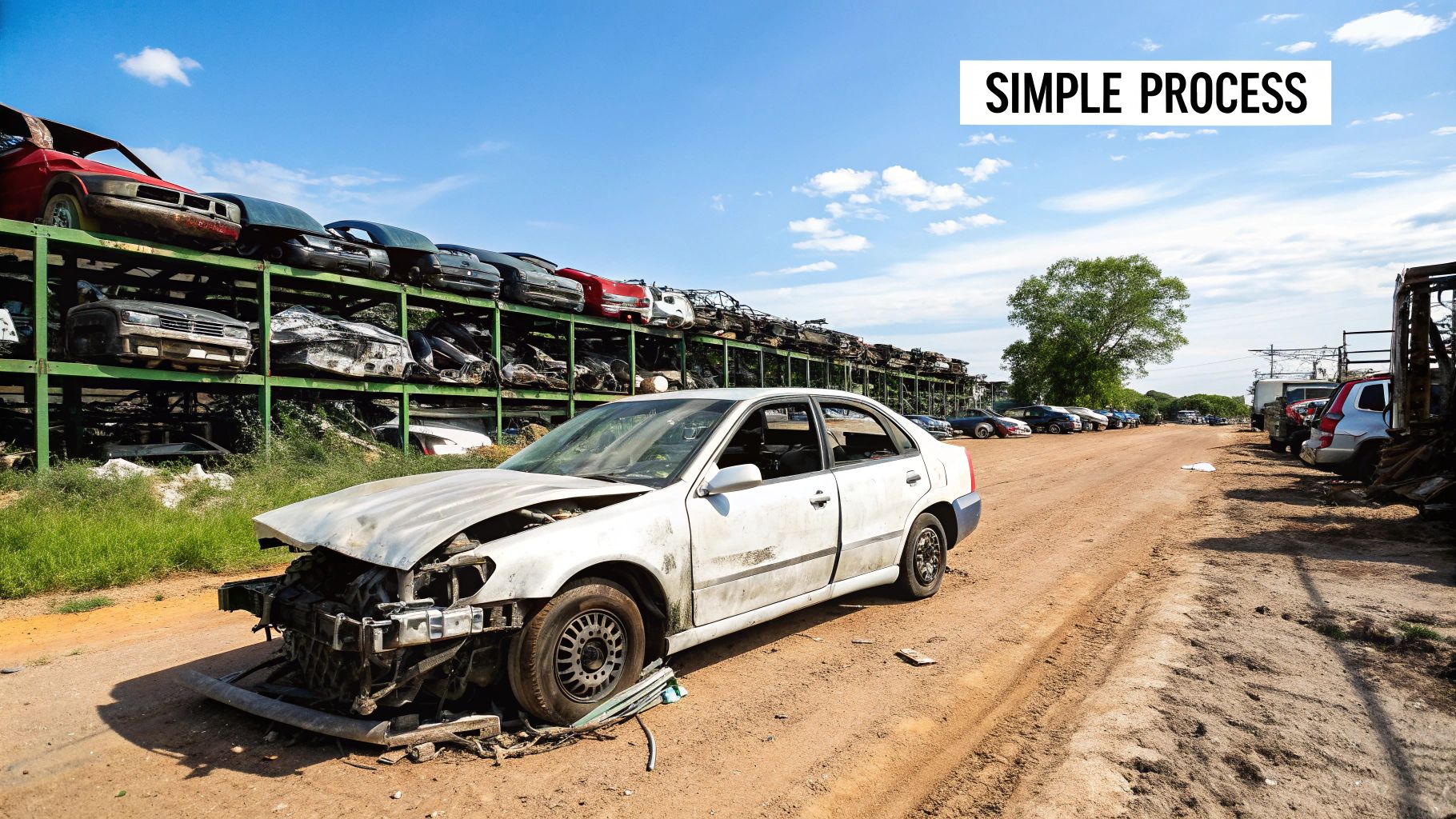
A little bit of prep work on your end can make all the difference on collection day. By getting your car and documents in order beforehand, you’re setting the stage for a process that’s quick, legal, and completely stress-free. It’s your final checklist before waving goodbye to your old vehicle.
The single most important piece of paper you’ll need is your V5C logbook, which is the official vehicle registration certificate. This is the document that proves you're the registered keeper and is absolutely essential for the legal handover to take place. Our driver will need to see it to confirm the car's details and handle the transfer of ownership.
What Happens if I Can’t Find My V5C?
Don't worry if your V5C has gone missing; it doesn't automatically stop you from scrapping your car. While having it on hand is definitely the standard, any reputable scrap company can still proceed. You will, however, need to provide a different form of proof to show you own the vehicle.
To get around this, you'll need to show a valid photo ID (your driving licence or passport works perfectly) along with a recent proof of address. Think of a utility bill or a bank statement from within the last three months. This is how the scrap company confirms your identity and your legal right to scrap the car.
Key Takeaway: No V5C just means one extra step for you. You are legally required to notify the DVLA in writing that you’ve sold your vehicle to a scrap dealer. Make sure you include the date of sale and the scrap company's information to absolve yourself of any future responsibility for the car.
With the paperwork sorted, it’s time to get the car itself ready. The first and most obvious task is to clear out all of your personal belongings. It’s incredible what we accumulate in our cars over the years.
Be sure to check everywhere, as things can easily be missed:
- The Glove Box & Centre Console: A common spot for old receipts, service history, and personal papers.
- Under the Seats: You'd be amazed what can end up rolling around down there.
- The Boot: Empty out any tools, emergency kits, or forgotten bits and pieces.
- Door Pockets: These are notorious hiding places for small, easy-to-miss items.
Lastly, give some thought to your number plates. If you have a private or cherished registration that you want to keep, you must arrange to have it transferred to another vehicle or put on a retention certificate before collection day. Once the car has been collected and scrapped, it's too late to get it back.
This small amount of preparation not only safeguards your personal information but also helps our collection team work quickly and efficiently. For a more detailed breakdown, our guide on how to scrap your car covers these steps and more, making sure you’re fully prepared for a smooth handover.
What to Expect on Collection Day
So, the day has arrived. The collection truck is on its way, and you're about to say goodbye to your old car. Knowing how it all works on the day makes everything feel less daunting and ensures a quick, secure handover. It’s a simple process, but there are a couple of essential checks and a bit of paperwork to get right.
When our recovery driver pulls up, the first thing they’ll do is a quick check of you and the vehicle. It's a standard security measure to prevent fraud, so don't be surprised when they ask for a peek at your photo ID to make sure you're the person who arranged the collection. They'll also match the car's Vehicle Identification Number (VIN) to the one on your V5C logbook. A quick, two-minute check and you're good to go.
The Handover and Getting Paid
With the identities confirmed, it’s time for the legal handover and, most importantly, for you to get paid. Our driver will walk you through everything, but it always helps to know what’s coming.
The key bit of paperwork is your V5C logbook. You’ll need to fill out Section 4 (if you have an older logbook, it might be Section 9). This is the part that officially tells the DVLA you've sold your car to a motor trader. You sign it, hand the main section to our driver, and tear off and keep the small V5C/3 slip for your records. Simple as that.
A Crucial Note on Payment: The Scrap Metal Dealers Act of 2013 made it illegal for anyone to pay cash for a scrap car. This was a big step in tackling metal theft. All payments must be traceable.
This means you’ll be paid either by cheque or, far more commonly these days, an instant bank transfer. We use instant transfers – our driver processes the payment right there and then, and the money usually lands in your account before your car has even been loaded onto the truck. It’s the safest way to do it, giving you complete peace of mind.
Here's a quick look at the journey from quote to collection.
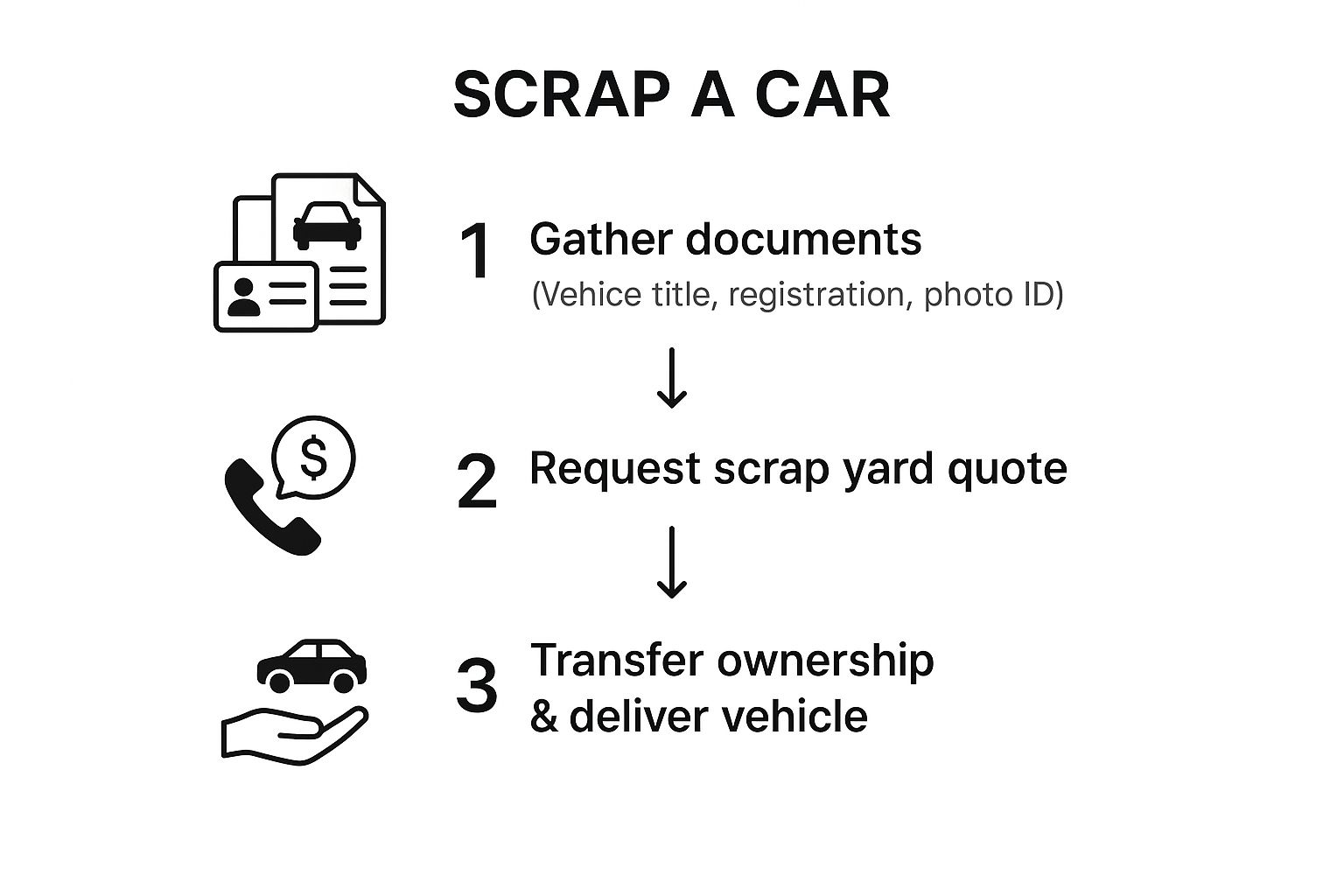
As you can see, once the documents are sorted, things move very quickly.
Your Proof: The Certificate of Destruction
Car gone, money in the bank. You’re almost done, but there’s one last piece of the puzzle: the Certificate of Destruction (CoD). This is your official, legally binding proof that the car has been properly scrapped.
The driver won't hand you this on the day. It has to be issued by the Authorised Treatment Facility (ATF) after your car has been fully depolluted and dismantled in line with strict environmental laws. The CoD confirms to the DVLA that your vehicle is officially off the road, and you are no longer responsible for it.
You should receive your CoD by email or post within seven working days. If it doesn't turn up in that time, make sure you chase it up. Without that certificate, you could technically still be liable for the vehicle, so it's a document you absolutely want to have.
Your Legal and Environmental Responsibilities
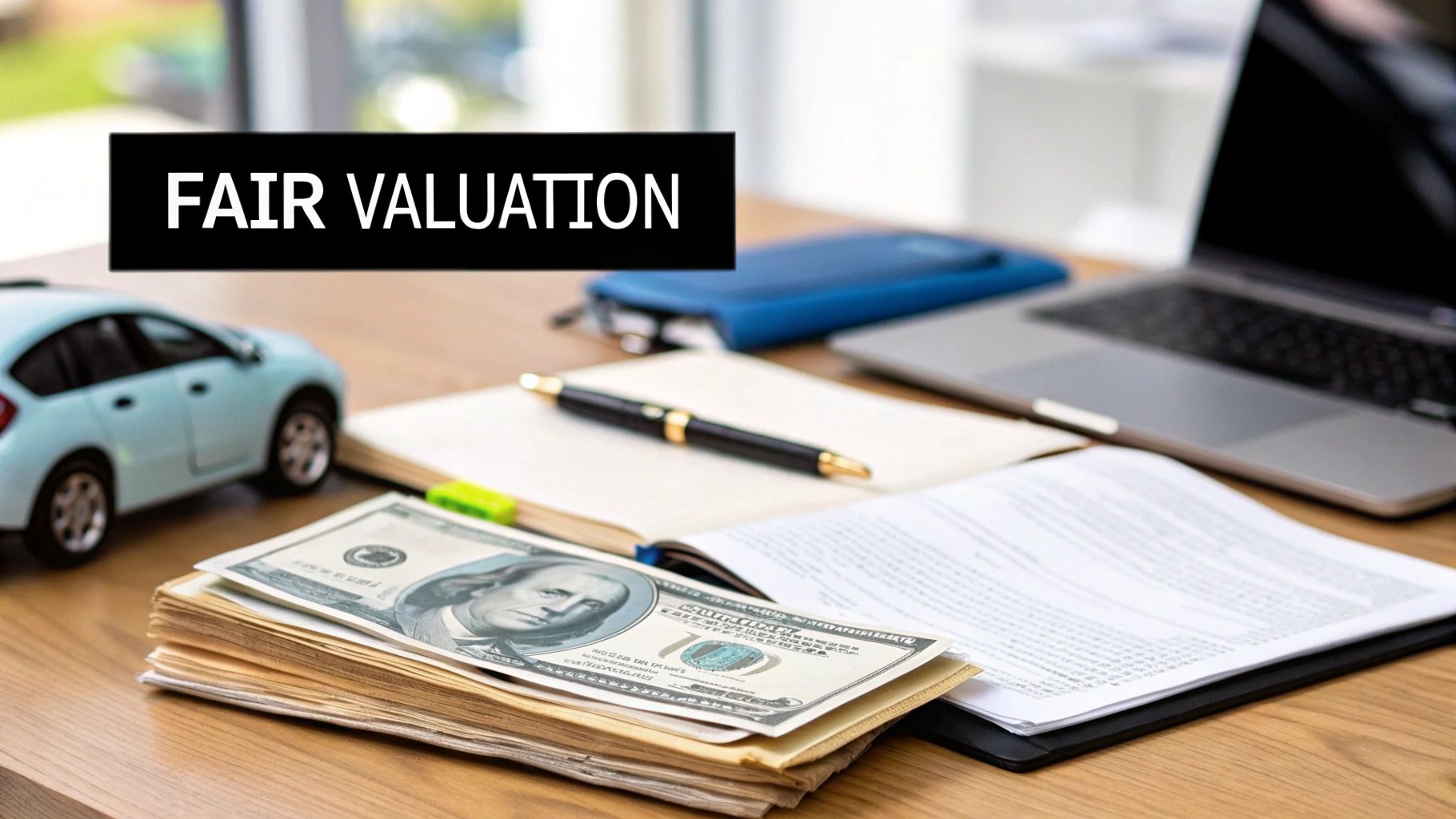
When it's time to say goodbye to your old car, it's easy to think it's just about getting it off the drive. But there's a bit more to it than that. You have a couple of important responsibilities, both legally and environmentally, that you need to get right.
Getting this process right isn't just about ticking boxes; it's about protecting yourself from future headaches and doing your bit for the planet. The single most important thing to remember is this: only use an Authorised Treatment Facility (ATF).
These are the only places in the UK legally allowed by the Environment Agency to scrap vehicles. It's not just bureaucratic red tape. ATFs are held to strict standards to ensure all the hazardous stuff inside your car is dealt with safely, not just dumped.
Why an Authorised Treatment Facility Is Non-Negotiable
When you hand your keys over to an ATF, you can be confident your vehicle is being handled in line with the UK's End-of-Life Vehicles (ELV) Directive. This is the law that governs exactly how a car should be taken apart and recycled.
An ATF follows a strict depollution process. This means they methodically drain and safely contain all the nasty fluids and components before the car is crushed. This includes:
- Engine and gearbox oil
- Brake fluid and coolant
- Leftover petrol or diesel
- The battery and its acid
- Harmful air-conditioning gases
After depollution, the real recycling begins. It's a process the UK has become very good at. In fact, by 2025, the UK managed to achieve an impressive 86.5% reuse and recycling rate for end-of-life vehicles, which is even higher than the EU's minimum target. You can read more about these UK scrap car recycling achievements.
Choosing an unlicensed scrap dealer might seem tempting, especially if they flash cash in your face. But the risks are massive. These rogue operators often just cut corners, draining oil onto the ground and causing real environmental damage.
Your legal protection comes from one document and one place: the Certificate of Destruction (CoD) issued by an ATF. Without this official DVLA document, you are still the car's legal keeper, even long after it’s been towed away.
The Dangers of Using an Unlicensed Operator
Let's be blunt. If an unlicensed collector takes your car and it ends up abandoned, dumped on a country lane, or even used in a crime, it's you who could face fines or prosecution. Can you imagine getting a speeding ticket for a car you thought was crushed months ago? It happens far more often than people realise.
Using an ATF isn't just about playing by the rules. It's about getting that crucial, iron-clad proof that your responsibility for the vehicle has officially ended. It’s a simple choice that protects you, your wallet, and the environment.
Still Have Questions About Scrapping Your Car?
It's completely normal to have a few questions buzzing around, even after walking through the whole process. Deciding to scrap my car isn't something you do every day, and making sure you’ve got all your ducks in a row is key to feeling confident about it.
We get asked a lot of the same things by car owners across London and Surrey. So, let’s tackle some of the most common queries head-on to clear up any lingering doubts.
Can I Scrap My Car if I Can't Find the V5C Logbook?
Yes, you can. It’s a common scenario, so don't worry. While having the V5C (the logbook) definitely streamlines things, it's not a complete roadblock if it's gone missing. After all, documents for an old car that's been off the road for years can easily get misplaced.
If you don't have the V5C, you'll just need to prove you're the rightful owner in another way. We'll simply need to see some photo ID, like your driving licence or passport, along with a recent utility bill or bank statement that shows your address matches where the car is registered. It's a straightforward identity check to make sure everything is above board.
A Crucial Point: When you scrap a car without the V5C, the responsibility falls on you to notify the DVLA yourself. You'll need to send a letter confirming you've sold the vehicle to a scrap dealer (that's us!), making sure to include our details and the date of sale. This is an essential step that officially takes the car out of your name.
How Quickly Will the Money Be in My Account?
Payment is practically instant. One thing to know is that thanks to the Scrap Metal Dealers Act 2013, it's illegal for any dealer to hand over cash for a scrap car. This law was brought in to clamp down on metal theft, so all payments have to leave a clear digital trail.
What this means for you is a secure and fast payment, usually via an instant bank transfer. Our collection driver will process the payment right there on the spot. In most cases, the money will appear in your account within minutes. Alternatively, we can arrange a business cheque if you'd prefer. Just be sure to let us know which you'd rather have when you book the collection.
What Exactly Is a Certificate of Destruction?
Think of the Certificate of Destruction (CoD) as your official get-out-of-jail-free card. It's a legal document issued by the Authorised Treatment Facility (ATF) where your car is processed, and it's logged directly with the DVLA.
This certificate is your ultimate proof that the vehicle has been taken off the road for good and recycled correctly. It formally ends your responsibility for the car. Once you have it, you can’t be chased for road tax, parking tickets, or anything else linked to that registration number. It’s your final piece of the puzzle, and you should receive it by email or post within seven days of collection. If it hasn't turned up by then, give the ATF a nudge.
Got more questions? We've covered a whole host of topics over on our frequently asked questions page.
Ready to get a fast, fair, and reliable quote for your scrap car? Fast Scrap Car offers instant valuations, free same-day collection across London and Surrey, and immediate payment. Get your guaranteed price today at https://fastscrapcar.co.uk.
